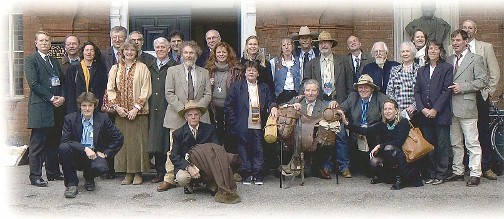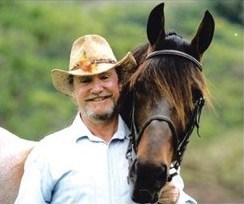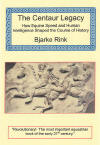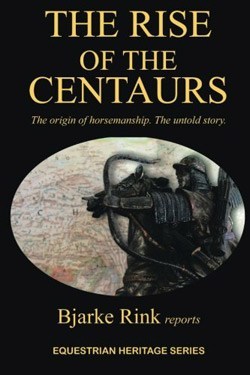|
Demise of Extraordinary Equestrian Scholar Bjarke Rink by CuChullaine O’Reilly FRGS
|
|
Early in the year 2004 an American equestrian journalist sent me an email regarding equestrian travel. What had been an ordinary exchange of messages took an unexpected turn when this talented horse woman remarked that she faced a dilemma.
An unknown author living in Brazil had mailed her his unpublished manuscript. Knowing of the journalist’s contacts within the American equestrian magazine trade, the aspiring writer hoped that the reporter could introduce him to a publisher.
The author’s name was Bjarke Rink and his literary aspiration had lain in the reporter’s desk drawer for five years.
Knowing that the Long Riders’ Guild had begun an extensive new publishing programme, the journalist asked if I would be interested in seeing this neglected work. When I asked her to describe it, she couldn’t. It was, she truthfully said, unlike anything else she had ever read.
Truer words were never spoken.
The author was Bjarke Rink and the forgotten manuscript was the now legendary Centaur Legacy.
I did not know at the time that Rink was a Danish horseman, horse breeder and writer living in Brazil. I was not expecting the arrival of a revolutionary manuscript, one whose concepts could not be confined to a single language or country. I could not have foreseen that what was coming was the equivalent of an equestrian revolution.
Instead, when the large parcel containing the manuscript arrived, I opened it with no preconceived conceptions other than I thought the work was about horse history.
That’s akin to saying Mozart is about music.
I don’t remember what I expected, but having my mind electrocuted wasn’t on the list.
I read The Centaur Legacy straight through and then on July 9, 2004 I immediately sent Bjarke Rink an email.
“I write you today to extend my deepest appreciation for your manuscript - The Centaur Legacy.
There have been four occasions in my life when a singular book arrested the normal movement of my life. "For Whom the Bells Tolls" - the Yusuf Ali translation of the Qu'ran - the biography of Sir Richard Burton known as "The Devil Drives" and your work, The Centaur Legacy, all caused me to re-chart the basic direction of my personal life. In every instance I can remember with utter clarity the sensation of knowing that I held in my hand a literary work of power and worth.
Uniquely, yours is the most challenging equestrian work I have ever read. And keep in mind I am well acquainted with the major equestrian authors from Xenophon onwards.
I write, edit and publish for a living, Bjarke. So please don't think for a minute that this is some sales pitch designed to wine and dine you from a distance. I detest false flattery. Years spent in the saddle as an equestrian traveller have taught me to be brutally honest with myself and everyone around me. Consequently, I use both my words and my praise after long and careful consideration.
Simply put, what I believe is this - The Centaur Legacy is, in my opinion, the most important equestrian manuscript in existence in the early 21st century. I believe it has the power to change the way horses and humans interact in this new century.
It is ground-breaking. And I believe that by having penned it, you have placed yourself in the ranks of the most important equestrian thinkers alive today.
This is not to say that I expect the equestrian world to embrace you!
I don't.
I believe your message is largely one that will upset, confuse and frighten the status quo. And this is, as we both know, because the horse world is largely chained to traditions - regardless of how baseless, counter-productive, illogical or immoral those traditions might be.”
My email concluded by extending an offer for the Long Riders’ Guild Press to publish Rink’s astounding book.
Once it was in print, it didn’t take long for equestrian scholars to grasp the monumental significance of Rink’s new interpretation of horse-human history.
|
The Foreword was written by Jeremy James, a Founding Member of the Guild and a leading equestrian historical author. Jeremy stated, “The Centaur Legacy is a work of towering importance. No one has had the courage, knowledge, skill, nor the understanding – ever – to deliver such mould-shattering work!”
|
Other experts expressed similar support.
The Centaur Legacy has already altered the way I think about riding, and altered how I teach ... I feel that it has helped me explain things more clearly and more importantly, helped the riders to make a better connection with their horses.
Robert Jones, Director, the British Horse Society
The Centaur Legacy is interesting and provocative, with novel and challenging ideas.
Dr. Matthew Mackay-Smith, DVM; Inductee into the International Equine Veterinary Hall of Fame and Medical Editor of Equus Magazine.
I believe we have something absolutely new on riding here. With a scientific approach, the fact-finding characteristics of a journalist, and a pinch of humour, Rink has had the audacity to interweave physiology and biomechanics with equitation’s long history.
Dr. Renan Sampedro, Professor, Federal University of Santa Maria, Brazil.
You’ll find no greater insight into the complexities of horsemanship than when you look into old questions with the new eyes of life sciences presented in The Centaur Legacy. Enjoy your journey.
Roberta Jo Lieberman, Editor, Equus Magazine.
In March 2005 a complete collection of the equestrian travel books in The Long Riders Literary Project was presented to the Foyle Reading Room at the Royal Geographical Society. Twenty-nine Long Riders flew in from five continents to witness this historic event.
|
Bjarke Rink was invited to attend the LRG/RGS meeting as a guest of honour, where his book was displayed and then donated. |
 |
During the subsequent years,
Bjarke continued to expand upon his singular research. His study of the genesis
of equitation led him to its source, the mounted nomadic cultures that
originated in Central Asia and then changed the course of history.
Bjarke wrote to explain that he planned to write a trilogy of books, “The series is conceived to offer the reader an in-depth view on the origin of horsemanship and the worldwide spread of equestrian power.”
| The first title in the series, The Rise of the Centaurs, put the reader in the saddle alongside the nomad warriors who were riding West on a campaign of conquest. |
|
Now, in 2019, fifteen years after I read Bjarke’s original manuscript, I can
still recall the excitement I felt when he explained that “the symbiotic
blending of key features of the horse and human resulted in the creation of
Homo-Caballus, which started having a different relationship with space and time
than the rest of humanity. For him the distances diminished.”
In response I wrote to Bjarke to say, “One day in the near future, I believe this statement, along with your attendant research which made it possible, will be seen as being as obvious as E=M c Squared. But though what Einstein proved is obvious to us now, there was a time when his ideas were ground breaking. That is how I view your work. It threatens to shatter the equestrian universe as we know it, forcing us to step back and re-examine a great many fundamentally accepted equestrian concepts. And as Einstein did, I believe the Centaur Legacy will ultimately prevail.”
Before his recent death, this enlightened scholar wrote, “My task is to try to do for horses what Stephen Hawkins did for space science, Jacques Cousteau did for undersea research and Daniel Goleman did for the working of the human mind: to popularize horses and equitation by focusing on the biological, physiological, anthropological, psychological and sociological unfolding of the symbiotic connection of humans and horses, and to register the seismic impact as equestrian power spread over the globe throughout history and was adopted by all the world’s major cultures.”
Prior to writing this obituary, the Long Riders’ Guild received a request from a librarian at a Canadian university. She was seeking additional information about The Centaur Legacy.
Rest in peace, Homo-Caballus.
.Home



